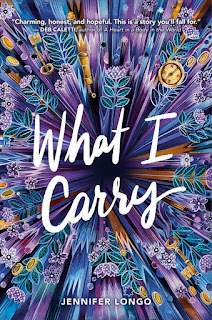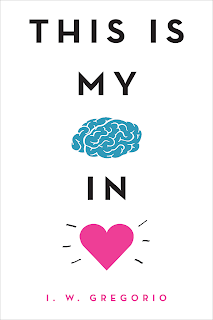Synopsis (via Goodreads): For readers of Robin Benway's Far From the Tree, a powerful and heartwarming look at a teen girl about to age out of the foster care system.
Growing up in foster care, Muir has lived in many houses. And if she's learned one thing, it is to Pack. Light.
Carry only what fits in a suitcase.
Toothbrush? Yes.
Socks? Yes.
Emotional attachment to friends? foster families? a boyfriend? Nope!
There's no room for any additional baggage.
Muir has just one year left before she ages out of the system. One year before she's free. One year to avoid anything--or anyone--that could get in her way.
Then she meets Francine. And Kira. And Sean.
𑁋𑁋𑁋
I received an ARC as a gift. My thoughts and opinions are my own. Any quotes I use are from an unpublished copy and may not reflect the finished product.
What I Carry was a brilliant, fantastic read! I am so happy and thankful my #otspsecretsister gifted it to me! Before receiving it in one of my boxes, I wasn't aware this book even existed, which is a tragedy, since it was absolutely perfect for me. I'm a fan of John Muir and his accomplishments, so all the snippets and quotes from his life and his works were an added bonus. They were gems that weren't hidden, but there for the entire world to find and enjoy.
Muir and Muiriel
made this story what it is, and the belief that you should do what you can to help those who can't help themselves. In Muir's case, trees (and nature in general) are defenseless and should be preserved. Muiriel was preparing herself to age out of the system, so she tried not to get attached to other people or places. She stopped caring about being adopted, but she still looked after the other foster kids that she shared homes with. Muiriel didn't keep in touch afterwards (with the exception of Zola), but she did what she could while she was there.
Adults have the power to really screw with a child's perception of the world and themselves, and some automatically assume foster kids are "trouble" or that
they did something to get placed in foster care.
A child does nothing to end up in foster care. The fact that they're there is partly due to a flawed system, and the blame should be solely placed on the adults in their lives. Adults have failed them in one way or another (either by family members and/or the government), and they shouldn't be blamed for being upset about it their circumstances. They have every right to feel angry, hurt, and betrayed.There's
nothing wrong with them, they just don't have a cookie cutter family.
Jennifer Longo said she wrote this book because her daughter asked her to. Her daughter said she wanted a story that was realistic based on her experiences, and that not everyone was molested or abused in foster care. Sometimes, it just sucks. I think the author's personal experiences mixed with her daughter's really made this book something uniquely original. Muiriel's story will be something others can relate to, while also being informational for those with no experience with the subject matter.
I really loved the secondary characters! Francine, Joellen, Kira, Zola, Sean - - it was an amazing group of people that I thoroughly enjoyed reading about. The author manages to squeeze in other important topics throughout the book, and I never felt like she was beating me over the head with the information. Everything flowed from one thing to the next, and I took my time getting to the end.
There's a subtle romance in the book between Sean and Muiriel, but the book focuses on Muiriel and how her experiences in foster care have shaped who she is today. She doesn't want to let herself love or care too deeply, because she's afraid of what that would mean for her future. The plan has always been to get out and make it on her own. Somehow. However, she can't keep herself from caring about the new people in her life that seem to need her just as much as she needs them.
Natan was despicable. Tiana and Katrina were incredibly frustrating. Racist white people and just dumb adults in general made me want to throw things - - but this was all intentional. The author paints a realistic picture of what it's like growing up in foster care, and how broken the system can be. There are good people, like Joellen and Francine, that do what they can to make it better, but there are so many kids... it's impossible to make sure they all end up in a nice home with nice people.
When I finally caught on to why the book was titled the way it was, it added an entirely new layer to my experience with this story. It was well-written, exceptionally realistic, and beautifully rendered.
I could honestly go on and on about how much I loved this book and its characters, and I could probably keep typing about how well the author addressed certain issues, but I'll leave it at this:
What I Carry was an amazing, thought-provoking read that I plan on reading again and again. There's something for everyone! Great characters, friendships, a subtle romance with a
genuinely good guy, awesome parents and adults, and people fighting for what they believe in. You have characters overcoming obstacles and learning about themselves, school bullies and judgmental educators.
It was practically perfect in every way.


















































